Bright “Basketmouth” Okpocha: Monster of All Trade
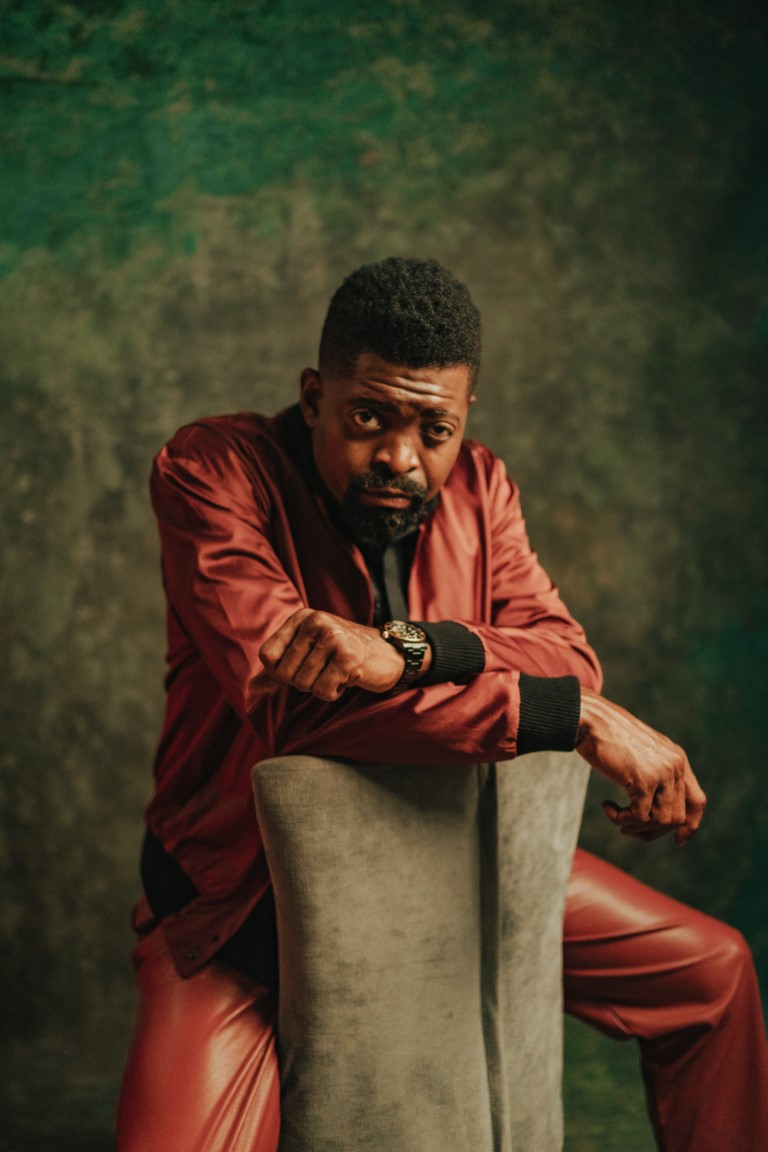
Transitioning within the entertainment industry, although reported as clearcut as possible, is a challenging thing to do. Each of these art forms we casually consume is different stakeholders actively living their dreams, one that they have nursed for practically their whole lives. With Bright Okpocha, widely known as Basketmouth, every dream is worth attending to. This is why he took a break from music to establish himself as the biggest name in Nigerian comedy, thanks to years of consistently cracking people up. Twenty-four years later, Bright is not just back to making music; he is doing it at the highest possible level—production.
In almost three decades of marinating himself in the deep fruitful waters of Nigerian entertainment, Bright has gone on to not only tell jokes but rap, act, produce and direct some of the country’s biggest films, TV series, and concert events. All of these culminate in a career so multifaceted one cannot predict what his next creative move might be. DOWNTOWN’s Editor, Onah Nwachukwu, sat with the multi-talented artist to chronicle his journey from forming a rap crew that went by the name ‘Da Oddz’ in the late 90s to touring the world with comedy and deferring an invite to produce his own Netflix Standup.
You were a part of a music group years ago. How did you make the transition to comedy?
Even as we made music, almost everybody— my childhood friends—in that group was funny, but I didn’t realise that being funny was a talent. I thought that people should be funny because everyone around me at the time was funny, most of them even funnier than I was. So when we formed the group, comedy was still a part of it because when we were rapping, I was still trying to make people laugh. We always take breaks to crack jokes. But the music never got launched in the true sense of it because, at the time, although we were doing shows and university tours, we were an up-andcoming rap crew, so we never really got into the music scene until I broke into comedy, of which, it took me another 24 years to go back and do it. Even today, one of the guys, Dominic—his rap name is Item 7—is based in Austria, making his music as an aside to his nine-to-five. My brother is doing something similar as well, non-commercial music for now. As for me, my nine-to-five is comedy and TV, and I still make music because it is just my thing.
Would you say coming back to music was always the plan or something that just aligned?
It was part of the plan. When we started rapping, the music industry in Nigeria wasn’t commercial. Also, there was a disconnect because we were influenced by The Wutang Clan and other foreign rappers but no Nigerian rappers. This was when the only people doing rap in Nigeria were Junior and Pretty, who were underground artists. At the time, I said to myself, ‘Bright, this is not going to go anywhere.’ That was based on foresight which I think is something God blessed me with. So I decided to focus on comedy, knowing I would someday return to music. At the time, the music I wanted to create was different from the kind that trends. The first album, Yabasi, was an experimental work. I love that I completed that journey because I had decided to blend Igbo highlife and hiphop like 25 years ago, and I’m happy I waited 25 years and still did it, and it worked. So it was like a dream come true.
In addition to comedy, TV and music, you are also into event production. How would you say you tally all three?
TV requires music on a large scale. I jumped into music because I was making Papa Benji, and the show needed a lot of music, and I wanted to avoid going to get music from people. So I saw it as the perfect opportunity to create my own music, bearing that I had just met a brilliant producer, Duktor Sett. Blending film and music is easy for me because they complement each other. The only thing that is difficult in making music is the promotional aspect of it. But blending TV and stand-up is very difficult because, with TV, you shoot almost every day. On Flatmates, we produced about 260 episodes a year. That involved shooting every work day of the week.
My brother and I joined a ‘performing students’ organisation in school as a rap crew. Because most of us had left the country, we decided to call ourselves ‘Da Oddz.’ For our first show has Da Oddz, I was in Ekenwa campus in Uniben(University of Benin). The show was called 300 Men Groove, and the MC/comedian was doing a terrible job, and the crowd was upset. I told Dotun, who is still my manager, “I can do this thing better.”
He spoke to the show promoter, who had doubts as I was billed to perform as a rapper. But he didn’t have anything to lose as the audience was increasingly annoyed by the MC. So he gave me five minutes, and I ended up doing 45 minutes. I did so well telling the silly little jokes that the audience kept hitting their desks in excitement. It felt really good. The next day as my friends and I got to a restaurant to eat, people kept walking up to me saying, “Bright, you killed it last night,” because we had an outstanding performance as a rap crew, and I entertained the crowd as a comedian. I even had someone pay for my food, which felt so good because I didn’t have enough money to feed myself then. So I was like, ‘if this is the way to eat, then I’m going to do all the gigs.’ And that was how it started.
How did you break into comedy shows outside school?
One time, one of my friends at Delta State University, Abraka, told me about a show happening in my school, Uniben, with Alibaba performing. So he came to Uniben to watch the show and bought a ticket for me, it cost 50(Fifty) naira at the time. I sat there and watched Alibaba perform for the first time because I hadn’t seen a Nigerian comedian; I didn’t know how they did it.
At the end of the show, while everyone was laughing, I was having a general meeting in my head. I wanted to meet him but couldn’t get through to him. I heard that the show was annual, so I knew I needed to work myself up to the point where I could open for him the next time he came. I started doing all the gigs available in school. I would work my way into any faculty doing their end-of-the-year party to perform there. I was getting paid for a few of the shows, but I didn’t really care about the money. Eventually, word went around, and I got called to perform at the next Alibaba show. I was satisfied.
When it was time for the gig, they put me first because I’m young and new, so I begged them to move my performance towards the end of the up-and-coming acts. Alibaba hadn’t come, and if I had performed earlier like I was scheduled to, Alibaba wouldn’t watch my performance. So I tried my best to avoid being called. I hid and told people to beg the show’s producer for me. He eventually agreed, and I performed my set when Alibaba was in the audience. After my performance, he, alongside everybody else in the hall, gave me a standing ovation. That was how comedy started because he gave me his card and told me to look for him whenever I came to Lagos. I didn’t even wait [laughs].
You’ve been doing a lot more concerts and events these days. Is that something you are going to continue with?
Yes. With concerts, I have been producing shows for a while. Most things started in Uniben. We weren’t getting a lot of shows in school back then, and I had access to the likes of the Remedies and Plantashun Boiz based on the fact that I was a rapper— we used to hang around then, Tuface knew me as a rapper, I opened for the Plantashun Boiz even before Faze joined them. So I said, ‘I know these guys; why don’t I bring them to school?’ So I brought together four guys and told them about my plan to bring the Plantashun Boiz to school and the cost implications. I told them the show was on a 150,000 (one hundred and fifty thousand) naira budget, so I asked them for 30,000 (thirty thousand) naira each, and they trusted me based on the entertainment I’d been doing at the time. They all paid their quota, adding up to 120,000 (one hundred and twenty thousand) naira, which was the exact amount I needed (laughs). I didn’t have 30,000 (thirty thousand) naira. How? When I was receiving N300 (three hundred) naira per gig (laughs). Yeah, now my friends know the truth](laughs). I then got Tuface at a discounted rate because, typically, the show would have cost me about 200,000 (two hundred thousand) naira. (Oh my God, I’m too smart [laughs].)
Of course, the show sold out; it was Plantashun Boiz live in Uniben. After that show, I spoke to my friend, Bayo Adekeye. His father was a senator, so he had some connections. At the time, Bayo had a company called Baron’s World Corporation. I liked the name and asked if I could open a company and call it Baron’s World Entertainment. He liked the idea and said we should do it. We needed to be more creative, seeing that we were now a company, even though we hadn’t registered it at the time. We did a gig called Laugh and Jams and had Alibaba perform. So I went to Alibaba’s office and told him, “boss, I’m doing a gig and would like you to perform.” And he did it for me for free. All he asked of me was to come to Lagos so that we could drive to my school together, so we drove down in his car, and he checked himself into a hotel on arrival. After that, we had a show called Splash cancelled because of a riot in school. It was supposed to be a pool party with DJ Jimmy Jatt. So I took Laugh and Jams to Ekpoma and began to feel like a show promoter. I came to Lagos and figured I had to step things up, so I registered the company. I also brought Laugh and Jams to Lagos, and we did it for two years. In two years, I had done about 24 shows. If you are talking about experience, that is experience. I made many mistakes with sound, lighting, gating, and other things. I was learning on the job and became a ‘monster.’
Asa’s concert was phenomenal. How did you manage to pull it off?
When I decided to do the Asa concert, there was no budget; I didn’t have a dime. I just said I would do it. Ropo—the person who got me the gig) told me how much it would cost, and I said yes, I would do it. I just pulled out 1.5 million (one million, five hundred thousand) naira, made arrangements for the press conference and called Asa. Then I told her management that I could only pay her after the show or at least a day before. That was the only money I dropped throughout because Asa is an easy sell, she’s a great performer, and I think I’m one of the best producers in Nigeria. So the moment we announced the show, tickets started selling, and we used the ticket money to sort several things until sponsors came along.
We are in party season; apart from Adekunle Gold, are you planning for any other shows for this year?
No. (pauses for a few seconds) But I’m trying to do something with a guy called Ogranya. He’s new. I love his music and think he will be a great performer. He opened for Asa. I’m interested in his work; that’s the reason why I put him on. So I’m thinking of doing something with him this Christmas, it’s not going to be too loud. Promoting shows gives me joy. The Asa concert hit differently, as it was my first music concert. I joined the crowd and sat down there when she got on stage. That was the first time I watched my show; I usually don’t from the place of the audience, I watch it from backstage, but this time I was like, let me enjoy this show. I could see how excited the audience was, and I was proud to have been a part of what they were experiencing. That is my joy. Money has never given me satisfaction.
How did My Flatmates and the rest of your TV projects start?
The first house I rented in Lagos was in Iponri estate. At the time, I was the only person who had broken into the entertainment scene in Lagos, while some remained in Benin or other parts of the country. So I told them they could stay at mine if they had no place to stay in Lagos. Most of the comedians we celebrate today stayed in that flat. Sometimes we get to about 15 of us in a three-bedroom apartment. Because I like to be in the same space as whomever I’m creating with, Kayode Peters came to my flat, and we were chilling together at the dining table one day when the idea popped up in my head. I said, ‘let’s do it and call it My Flatmates’. My friend Nnamdi had a cool apartment at the time, which we used. The show ran for about two years; I couldn’t manage it. That wasn’t the time because I was still trying to muscle through comedy.
From acting those series: My Flatmates, Ghana Jollof, Papa Benji, up to an action movie, Brotherhood. How did you rehearse for the character?
When Jade told me about my character, I asked her if there was a character bible; she said, “no, we want you to create what you are comfortable with, but this is the design.” I agreed and started thinking of different ideas; initially, I wanted the character always to have a knife, but I let that go. Normally, I am a gangster— in my former life [laughs], so I was like, play your authentic self in the movie.
When she said action, I did what the director wanted me to do, and after that, I asked if I could do it again, but I would like to do it this way if you don’t mind. I did, and they loved it, and that’s the end product you see in the movie. To hold onto that character, I had to be angry every time I got on set, which was easy. Think about the current failures and all the difficulties in this county, and you get angry.
So let’s go back to comedy. One thing that has changed is how comedy is done in Nigeria. So there is standup comedy, and there are skit makers. Did you ever envision that the web play disparity would exist between stand-up comedy and skit makers?
Yeah, actually. As I said, I have foresight. So about seven years ago, I told my guys comedy was about to die. When I said that, I didn’t know how it would happen or what would trigger it, but I knew we would experience changes. At the time, I thought that it would be because of the massive inflow of comedians in the industry because we started having some crazy guys coming in to replicate someone else’s material and charge cheap rates.
So it made the new comedians lazy. Comedy is about originality, but many people weren’t original anymore, clients were getting tired of hearing the same joke repeatedly, and many people replicating what we had done. At that point, I was like, this is not going anywhere. Then the next thing, skit makers started coming up, and the pandemic came. I think I was the first person that started the whole skit thing. I want to believe myself, and Bovi started making skits about 12 or 13 years ago to promote my London shows. Eventually, people began using skits for content, which is now a thing.
Have skit makers replaced comedians?
Skit makers cannot replace comedians; it’s impossible. I say this with all due respect to every talent out there. They are not stand-up comedians, and most can hardly host a show professionally. So the fact that comedy is not bubbling like it used to doesn’t mean it is dead.
At a time, musicians used to lobby to perform at shows produced by comedians. Even actors used to lobby to host comedy shows. I know this for a fact.
Kevin Harts and co have their shows on youtube and digital streaming platforms. Will we get there? Why are we not doing that in Nigeria?
Eventually, we will get there. The difference between Nigeria and elsewhere is that we do not have comedy clubs in Nigeria. Every state in America has at least four to five comedy clubs where comedians can walk in and say I want to do a 15-minute set, and that’s how they rehearse their material. Here in Nigeria, there is no stage where you can go and try your new materials. You can only try it on that stage on the day of the event or maybe among some of your friends, but there is no avenue for you to test your jokes, so it is a risk. We do not have writers, agents, or promoters, so a comedian does everything himself; writes jokes, edits, promotes the shows and looks for sponsors. The pressure of being a comedian is really heavy. There was a time when Chris Rock wanted to go back to doing tours; he started by playing at comedy clubs in different states. Now we don’t have the opportunity to be on streaming platforms except YouTube, and we know the returns.
I’m flying out to South Africa in March for the National Comedy Festival; we don’t have those in Nigeria. Despite having about 220 million people, Nigeria only has one comedy club. The country is not designed right now to support stand-up comedy. A musician can make music right now and make money from a record label, streaming, show and all, but comedians can only make money from gigs they are getting paid. This is one of the reasons I told myself, ‘Bright, you cannot be just a comedian anymore; you have to diversify and spread yourself everywhere possible.
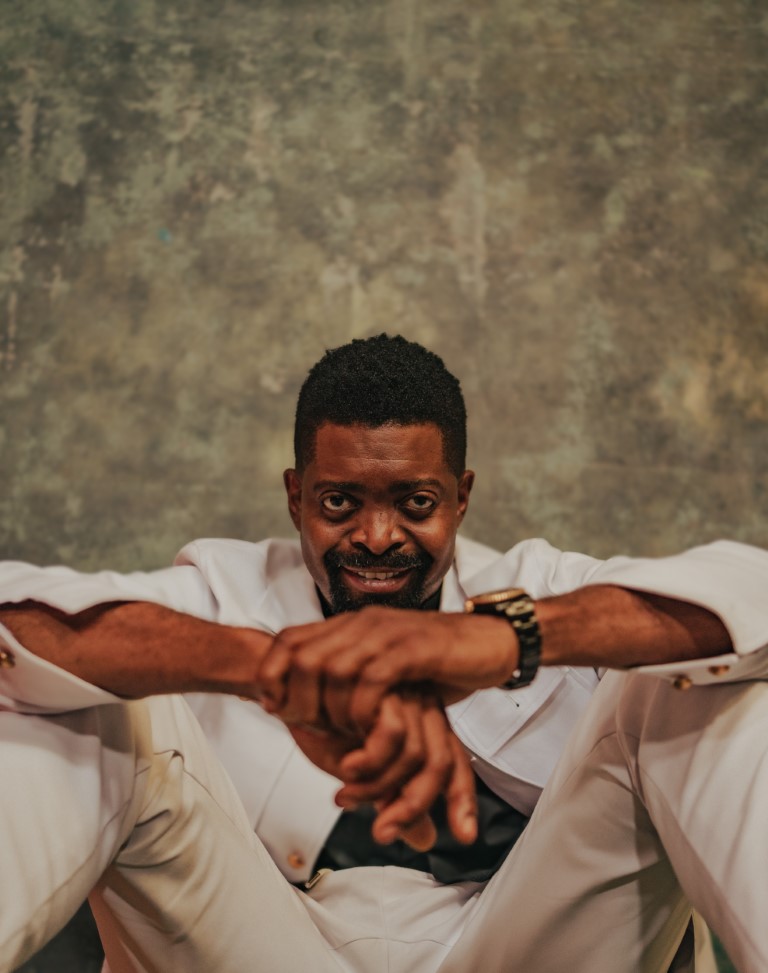
As you mentioned, with the development of comedy in South Africa, we’ve seen South African comedians with Netflix specials. Why aren’t you on Netflix?
I have been offered a special on Netflix; I told them I needed more time. So when they called me, and we had a zoom meeting, they said they wanted to see my set, what I was working with, I was like, ‘guys, I’m not writing right now. I am not ready.’ I could have come up with something for them, but if I am going to do my special on Netflix or any other streaming platform, it has to be an art, a massive piece, the best from anything anybody has done. I have been in the game for 24 years, so my special shouldn’t be easy. It was after I did my show in London that I knew I was ready. Because there was a time I actually lost interest in comedy, I picked interest in movies, TV, and music. Because I have been doing it for so long and have reached the point in my career where I can’t go beyond in this country, I decided to start touring with Russel Peters. It was a great experience. Imagine performing in front of 20 thousand people. That was when I began enjoying comedy again. I realised that I needed to be challenged more. Doing corporate gigs and weddings isn’t my thing; I am a stand-up comedian. So I decided not to do anything on this platform (stand-up comedy) except I was ready.
How did you prepare for the London shows?
I had written the set for the London show for a whole year. I was writing and trying them out at Live Lounge, a comedy club in Lagos. Two days before my show, I was chilling with Buchi and my manager, Dotun, and I decided to change my set for the show. So you can imagine writing a one-hour show in 48 hours—more like 24 hours because you have to perfect it on the day of the show. I did it, and I killed it. I loved it because the performance was just my experience from leaving my house down to get to the show. That was what I talked about. And on that show, I felt that thing I used to feel back then when I was doing comedy, the cheering because it was a challenge. The fact that I had to do it in 24 hours woke up that monster, and ever since then, I decided to go back to stand-up, so I went to Laugh Factory. Stand-up don dey sweet me again. Now I’m doing a tour in the UK, we are partnering with an American promotion company, and it has given me this renewed energy. So yeah, I’m back!
Does this mean you will be doing a major show soon?
I’m doing my one-man stand-up comedy show in Lagos after about four to six years, as I was not too fond of the last one in 2019. The new show was initially scheduled for the 5th of March, 2023, but Eko Hotel is booked on that date. We will announce a new date later.
There is some comparison between stand-up comedy and skit makers.
The comparison between stand-up comedy and skits is all about consumption. Skit makers mostly do slapstick comedy, and that is because people want to see exaggerated butts and whatnot. They have a lot of views on Facebook. But stand-up comedy is not always quick; you need to listen. Who wants to waste their data and listen to you go all cerebral on them? They want quick laughs. Kudos to the ones that are doing it. I won’t call them stand-up comedians, but they are really feeding the consumers what they want, and that’s why they impress me. It’s good because there is a market for everybody at every point in time. There was a time that Standup comedians were the thing, but now they are more tuned to skit makers. Now you see the skit makers hosting a couple of gigs, and I’m happy that I’m not actively in that space because of my foresight [laughs].
Which is more difficult for you; acting, comedy, music or concert production?
Concert production is the most difficult and scariest because, first of all, promoting a show is a huge risk. You may fail because you will have an empty show if you are not selling the right artist to the right audience. You will probably spend 200 million to make about 50 million. In Nigeria, they don’t insure shows, so you bleed once you start promoting a show and don’t have proper sponsors.
The risks are too high. Acting—third on my list— on the other hand, is fun. It just takes a lot from me because I write my own script, produce, act it, and sometimes direct, so most times when we are shooting, I am also directing in my head. That is why I often don’t like playing the front liner so that I can understand, pay attention, and correct whatever is going wrong. The only reason I’m going with comedy as my second is because when you buy a new car, na that new car go dey shack you. Music, just like comedy, is my way of life. I don’t just listen to music, I live inside it, and it controls my emotions. I’m a perfectionist, so I criticise every single facet of music. That is one of the reasons why I entered music; to create the kind of music that I can enjoy too.
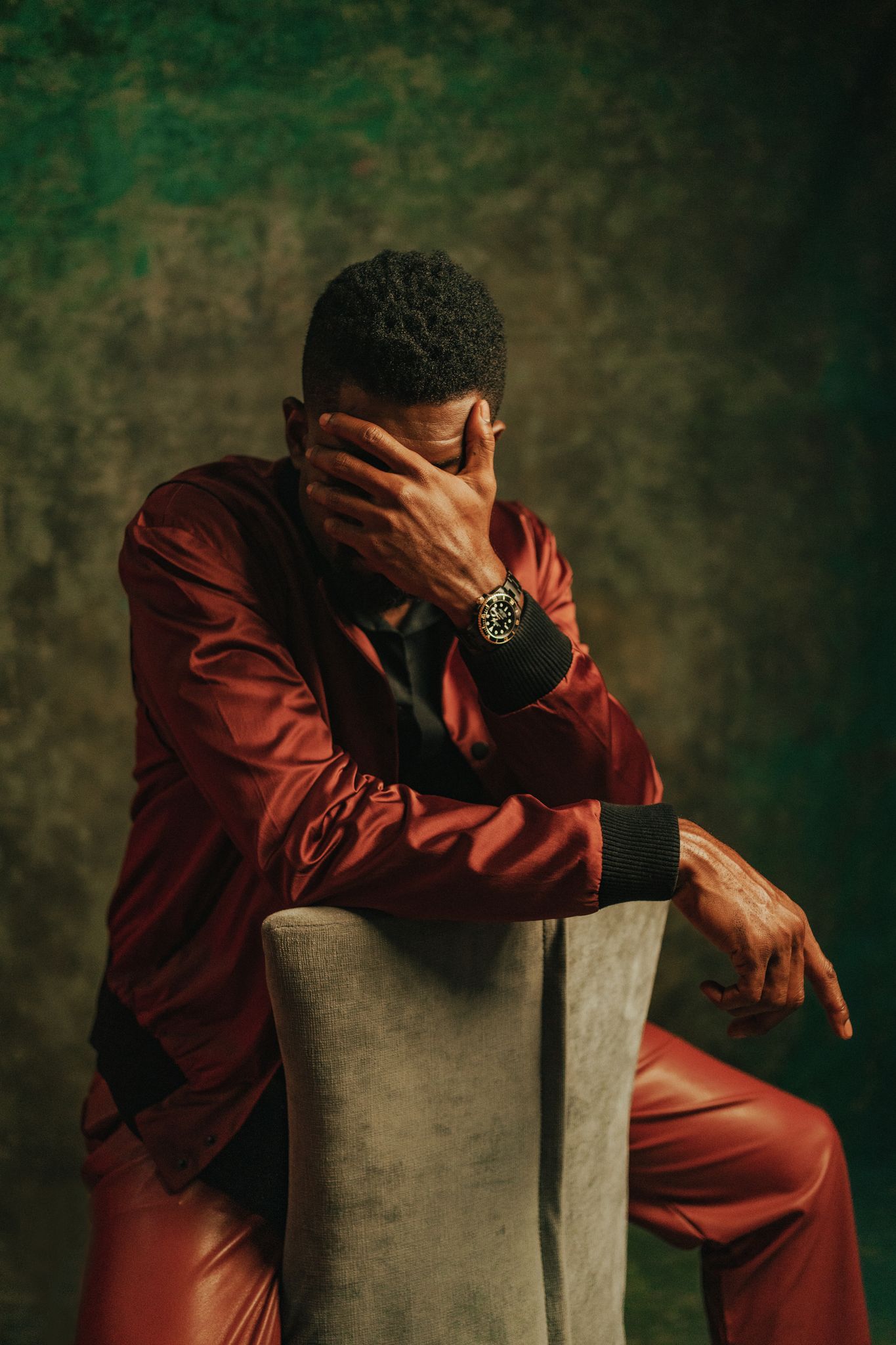
Photographer: Adewale Festus Adedamola @damolashotit Wardrobe: Basketmouth @basketmouth Styling & Creative Direction : Onah Nwachukwu @onahluciaa
Are we ever going to see you pick up the mic and rap on a song or stage?
I just want to make music, I don’t want to perform it on stage, and that’s why I stayed away from Yabasi. When I released Yabasi, I did not feature in any of the songs in that album. Why? Because I didn’t fit into the album into any of the tracks, I didn’t want to force myself. But when I did Horoscopes, there were a few songs that, when I heard the beat, I felt I could do, which was what I did. I do not create music with someone in mind. I make music, and the music tells me who will fit into it and not the other way around.
Now, in terms of actively rapping or making music, I will be cautious because I don’t want that switch to be too quick. But I will be doing some features like there is a song that Ill Bliss is working on, he’s got Peruzzi on it, and I’m on that song as well. That might be my first major appearance on any song, so I’m going to grow into it but not too fast, slowly, so that I do not throw people off. But am I coming on stage to rap? I am still determining. I’m shy [laughs].
You were in the news with a colleague, AY, at some point. What was that about?
All I heard were distant echoes. I don’t pay attention to these things.
How have you managed to live a scandal-free life?
I don’t club, drink or do any of those things. I used to drink but not anymore. I don’t expose myself to places that are packed with temptations.
Some people will say the best way to avoid temptation is to fall for it. I don’t want to be that person. Secondly, I do not bring my personal life to the public; I do not discuss my personal life with any media personality or anyone. Thirdly, I don’t make friends with people I do not trust. You have to be in my circle. I’ve known most of the people around me for 24 years, so I feel protected. I’m safe. I do not believe in the industry in terms of loyalty from all of these guys. One person that I trusted with all my life was Sound Sultan. Another person I trust a lot is Tuface, and there’s also Okey Bakassi and other guys I’m also cool with. I don’t get involved in anything if it’s not my business. I stay away from the madness in the industry. It is hard for you to see me playing around that space. With all due respect, I am not part of the industry; I am an industry. I play only in my own space. I make music, movies, and events. I am enough for myself, so I cannot blend into the space; it will be chaos.
A lawyer by training, Onah packs over a decade of experience in both editorial and managerial capacities.
Nwachukwu began her career at THISDAY Style before her appointment as Editor of HELLO! NIGERIA, the sole African franchise of the international magazine, HELLO!
Thereafter, she served as Group Editor-in-Chief at TrueTales Publications, publishers of Complete Fashion, HINTS, HELLO! NIGERIA and Beauty Box.
Onah has interviewed among others, Forbes’ richest black woman in the world, Folorunso Alakija, seven-time grand slam tennis champion, Roger Federer, singer Miley Cyrus, Ex Governor of Akwa Ibom State, Godswill Akpabio while coordinating interviews with Nigerian football legend, Jayjay Okocha, and many more.
In the past, she organised a few publicity projects for the Italian Consulate, Lagos, Nigeria under one time Consul General, Stefano De Leo. Some other brands under her portfolio during her time as a Publicity Consultant include international brands in Nigeria such as Grey Goose, Martini, Escudo Rojo, Chivas, Martell Absolut Elix, and Absolut Vodka.
Onah currently works as the Editor of TheWill DOWNTOWN.




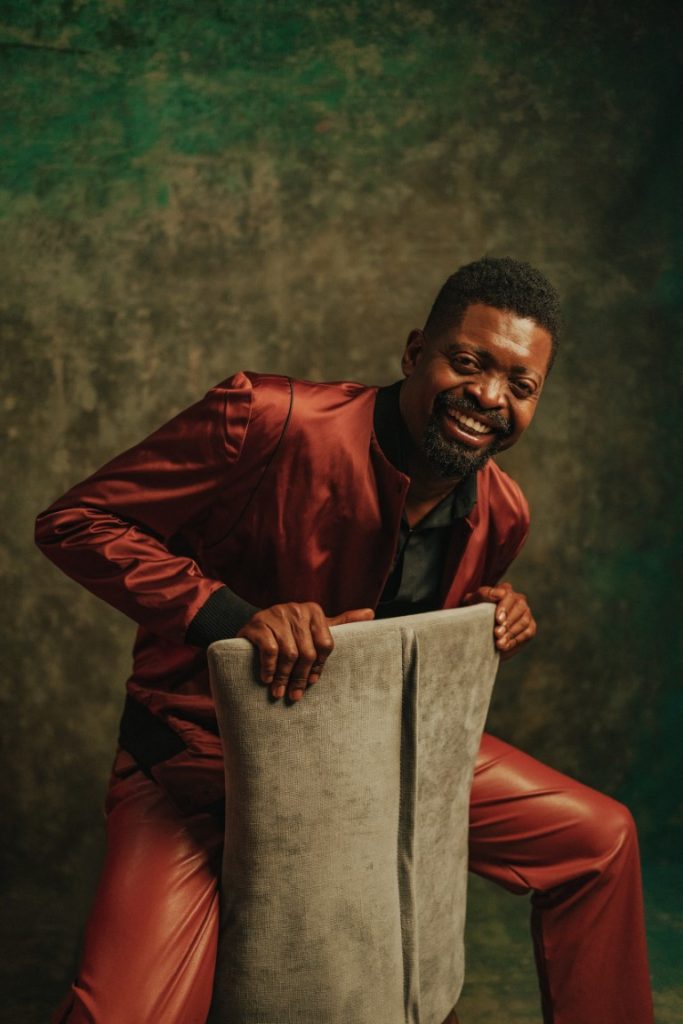
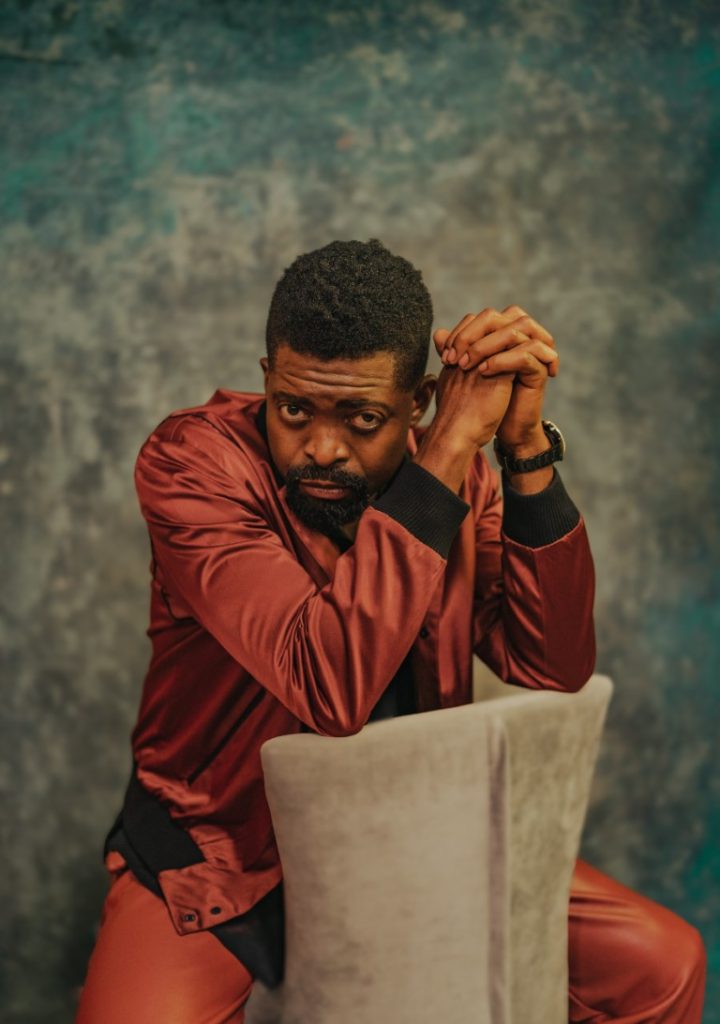
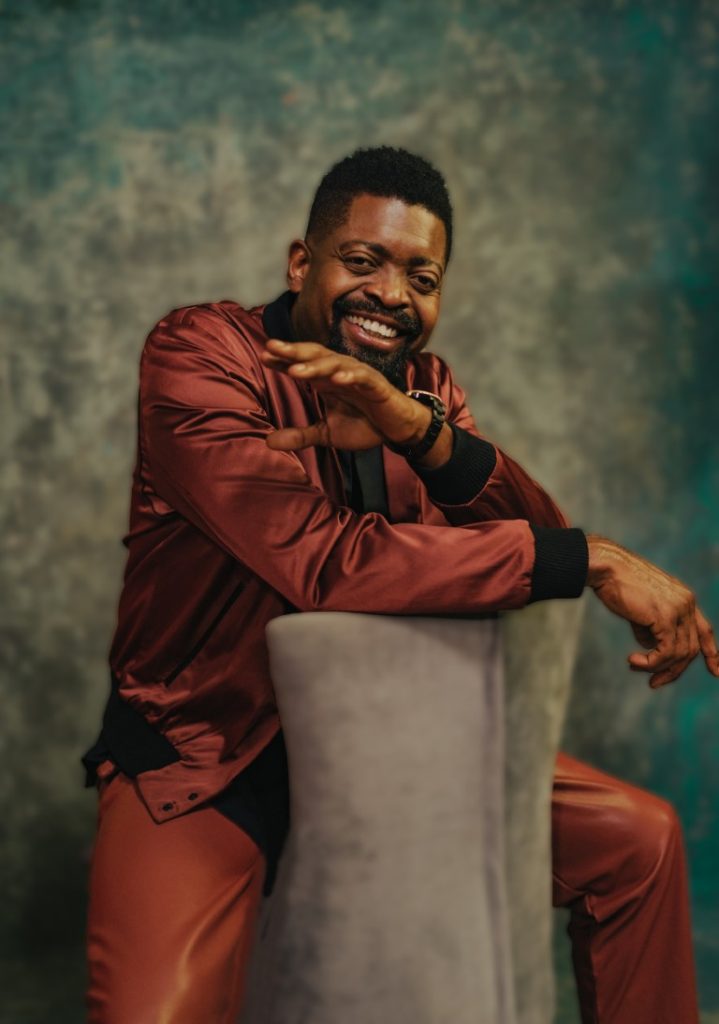
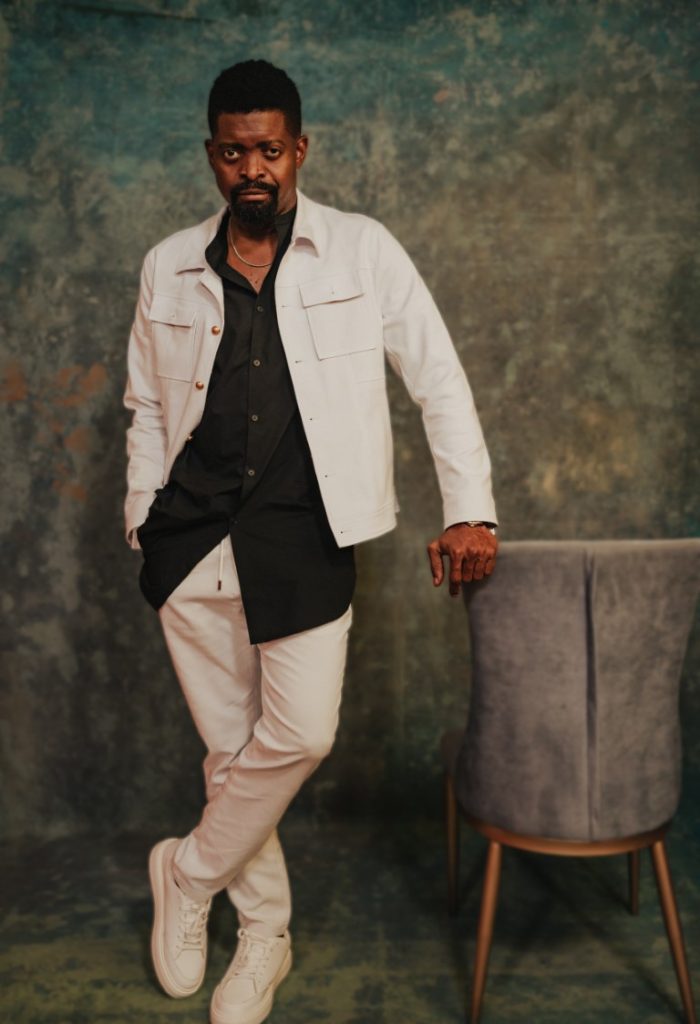
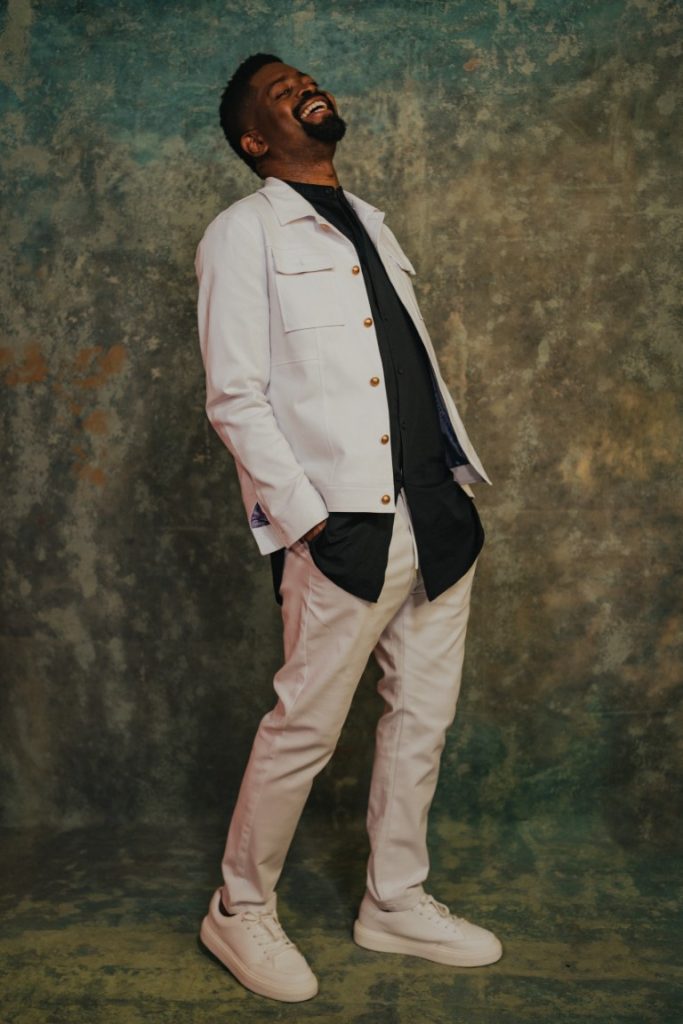

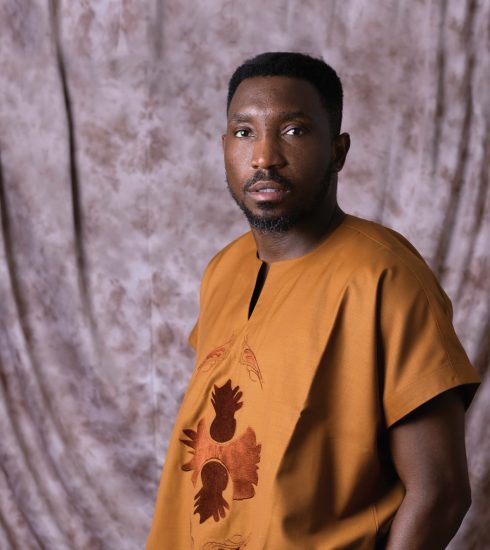

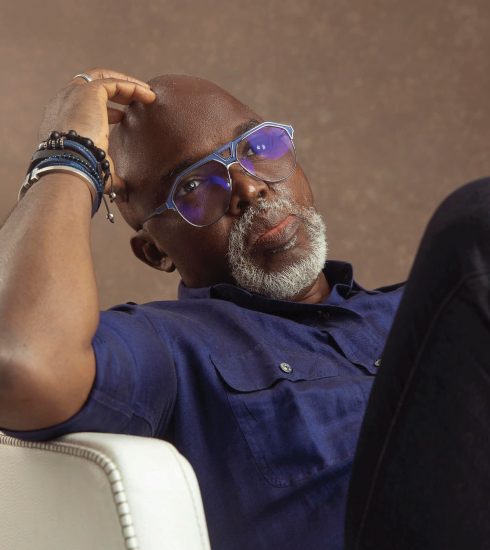
Joseph Egona
3 years agoThis is an amazing interview that reveals so much ingenuity of Basketmouth. Well done!!!
Paul Ajuka Okah
3 years agoThis is a comprehensive and interesting interview. I’ve lesrnt a lot on the personality of Basketmouth. Deeply appreciated.